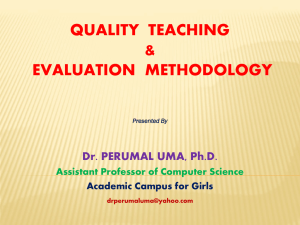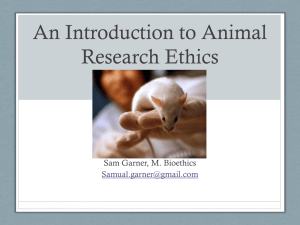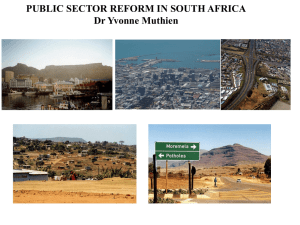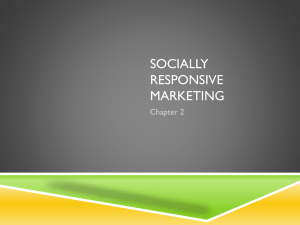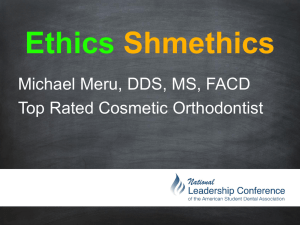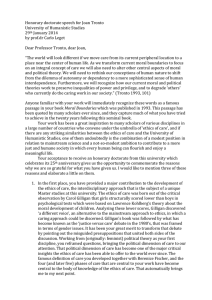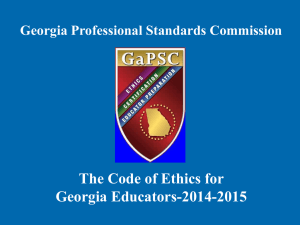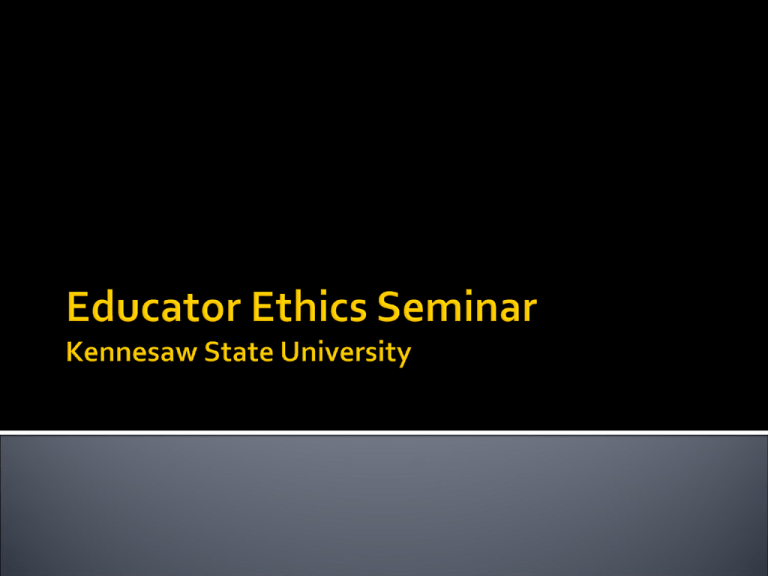
Eddie Educator is a new principal at City County
School District. Eddie recently moved to
Georgia from West Mars, Alabama, and is
unfamiliar with the Georgia Professional
Standards Commission’s Code of Ethics. When
is Eddie legally presumed to be completely
familiar with the Code of Ethics and all decisions
of the Georgia Professional Standards
Commission?
(a) It shall be the duty of the
commission, by regulation,
to adopt standards of
performance and a code of
ethics for educators. . . .
(b) Upon the adoption by the
commission of standards of
performance and a code of
ethics as provided in
subsection (a) of this Code
section, educators of this
state shall be obliged to
meet and comply with such
standards of performance
and to abide by such code of
ethics.
PSC
Educator holds certificate
from Commission;
Must abide by Code of
Ethics;
Loss of employment does
not affect certification.
District
Educator holds contract from
local district;
Can have employment
terminated for specified
reasons – including violation of
Code of Ethics;
Loss of certification may
breach contract of
employment.
PSC
District
Substantive Rules
The prosecutor?
Substantive Rules
The Prosecutor?
Superintendent
Attorney General
The judge?
The Commission
An Administrative Law Judge
•Board of Education
The “Judge”
The Impact?
Generally perceived as
indictment of conduct
The Impact?
•Not all grounds are ‘fault’-based.
•It is possible to work again
Certificate revocation?
Possible Consequences of PSC
Complaint
Possible breach of
contract.
Public release of
information –
including national
clearinghouse.
May have
opportunity to
explore different
career paths.
Commission of Act
Criminal Investigation
Criminal Prosecution
District Investigation
Proposed Termination
Court of Law
PSC Investigation
Proposed Discipline
Board of Education
Acquitted
Administrative Law Judge
Terminate
Suspend
Today’s Discussion
Definitions of terms
Ten Standards
Reporting
Requirements
Knowing “right from
wrong”
v
Applied professional
ethics.
Who is an Educator?
An educator is a
teacher,
administrator, or
other personnel who
holds, or has applied
for, a PSC
certificate, license or
permit.
Who is a Student?
A student is any
individual enrolled in
the state’s public or
private schools from
preschool through
grade 12 or any
individual between
and including the
ages of 3 and 17.
Standard One
An educator should
abide by federal,
state and local laws
and statutes.
Moral Turpitude
In Georgia, the test for
whether a felony is one
involving
moral
turpitude is “does the
[crime], disregarding
its felony punishment,
meet the test as being
contrary to justice,
honesty,
modesty,
good morals or man’s
duty to man?”
Crimes Involving Moral Turpitude
Fraud or false pretenses in obtaining something
of value
Pattern of failure to file federal tax returns
Larceny or a misdemeanor theft by taking
Sale of narcotics or other illegal drugs
Making a false report of a crime
Larceny after trust
Murder
Soliciting for prostitutes
Voluntary manslaughter
Criminal Issuance of a bad check
Crimes NOT Involving Moral
Turpitude
Possession of less than one ounce of
marijuana
Public drunkenness
Simple Assault
Simple Battery
Fighting
Child Abandonment
Driving under the influence
Carrying a concealed weapon
Misdemeanor criminal trespass
Unlawful sale of liquor
Misdemeanor offense of escape
Misdemeanor offense of obstructing a
law enforcement officer
Even if it’s not moral turpitude . .
..
Guilty includes
•a finding or verdict of guilty, or
•a plea of nolo contendere, regardless of whether an appeal of
the conviction has been sought;
•a situation where first offender treatment without adjudication of
guilt pursuant to the charge was granted; and
•a situation where an adjudication of guilt or sentence was
otherwise withheld or not entered on the charge or the charge
was otherwise disposed of in a similar manner in any
jurisdiction.
Criminal Acts include
•Murder
& Attempted murder
•Possession of crack cocaine
•Tampering with public records
•Possession of child pornography
•Sexual Assault
•Sexual Exploitation of Children
•Statutory rape
•Arson 1st Degree
•Attempted burglary
•Terroristic threats
•Peeping Tom
•Shoplifting
•Indecent Exposure
•Manufacturing Marijuana
•Contributing to the Delinquency of Minor
•Enticing a Child for Indecent Purposes
•Conspiracy to Manufacture Methamphetamine
•Grand theft and credit card fraud
•Stalking
Standard Two
An educator should
always maintain a
professional
relationship with all
students, both in and
outside the classroom.
Unethical conduct includes but is not limited to:
1. Child Abuse, including physical and verbal abuse;
2. Cruelty to Children or Child Endangerment;
3. Committing or Soliciting any unlawful Sexual Act involving
Students;
4. Harassing behavior on the basis of race, gender, sex,
national origin, religion or disability;
5. Inappropriate Relationship with a Student (written, verbal, or
physical ); and
6. Furnishing tobacco, alcohol, or illegal/unauthorized drugs to
any student or allowing a student to consume alcohol, or
illegal/unauthorized
drugs.
Abuse of Students Cases
Touched student with electric shock mechanism
Slapped a student
Struck a student in the head with a metal music stand
Taped a student’s mouth and tied his arms to his wheelchair
Kissed or “licked” students
Sexual relationship with student
Child molestation
Sent sexually suggestive e-mail to student
Videotaping girls’ locker room
Sodomy with students
Held child’s hand over burner of stove
Exposed himself to student
Oral sex with a student
Offered students money to pose for nude photographs
Standard Three
An educator should
refrain from the use of
alcohol or illegal or
unauthorized drugs
during the course of
professional practice.
Unethical conduct includes:
1.being on school premises or at a school-related
activity involving students while under the
influence of, possessing, using, or consuming
illegal
or
unauthorized
drugs;
and
2. being on school premises or at a school-related
activity involving students while documented as
being under the influence of, possessing, or
consuming alcoholic beverages.
Any activity sponsored by
the school or school
system (booster clubs,
parent-teacher groups, or
any activity designed to
enhance the curriculum,
i.e., Foreign Language trips

